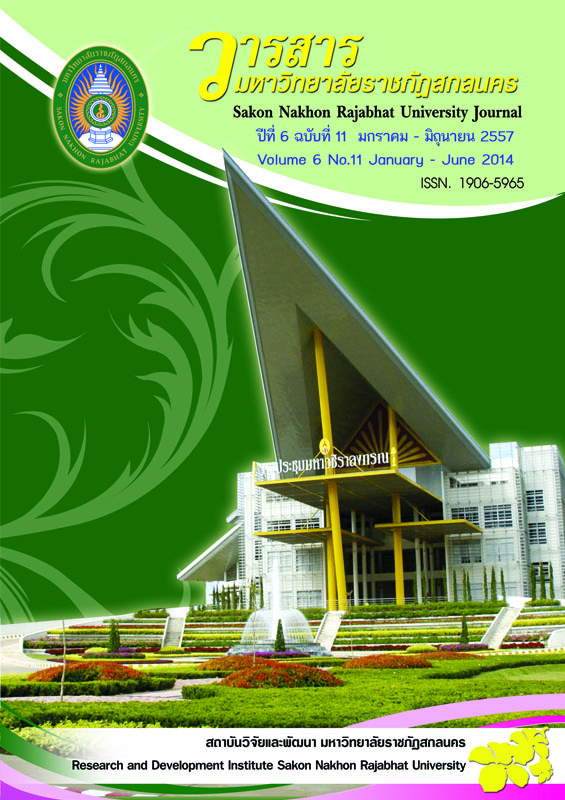การนำนโยบายการจัดการสิ่งแวดล้อม ขององค์กรปกครองส่วนท้องถิ่นไปปฏิบัติวิเคราะห์ การจัดการขยะของเทศบาลและองค์การบริหารส่วนตำบล ในจังหวัดอุบลราชธานีและจังหวัดอำนาจเจริญ
Keywords:
การนำนโยบายการจัดการสิ่งแวดล้อมไปปฏิบัติ, การจัดการขยะ, Implementation of environment policy, Solid waste managementAbstract
บทคัดย่อ
การวิจัยครั้งนี้มีวัตถุประสงค์เพื่อศึกษาการนำนโยบายจัดการสิ่งแวดล้อมด้านการจัดการขยะขององค์กรปกครองส่วนท้องถิ่น (อปท.) ไปปฏิบัติ วิเคราะห์ปัจจัยในการนำนโยบายไปปฏิบัติ รวมทั้งปัญหา อุปสรรคและข้อเสนอแนะ วิธีการวิจัย ใช้ระเบียบวิธีวิจัยทั้งเชิงปริมาณและเชิงคุณภาพ การเก็บข้อมูลเชิงปริมาณด้วยแบบสอบถามจากกลุ่มตัวอย่างในจังหวัดอุบลราชธานีและจังหวัดอำนาจเจริญ 3 กลุ่ม ได้แก่ 1) องค์กรปกครองส่วนท้องถิ่น 2) ข้าราชการการเมืองและข้าราชการประจำของ อปท. 3) กลุ่มกรรมการชุมชน ส่วนข้อมูลเชิงคุณภาพใช้วิธีการเก็บข้อมูลด้วยการสัมภาษณ์เจาะลึก และการสนทนากลุ่มกับข้าราชการการเมืองและข้าราชการประจำของ อปท. และกลุ่มกรรมการชุมชน จากทั้งสองจังหวัด ผลการศึกษาพบว่า การนำนโยบายการจัดการสิ่งแวดล้อมของ อปท. ในการจัดการขยะมีความแตกต่างกันไปตามขนาดของ อปท. สภาพปัญหาของท้องถิ่นและข้อจำกัดต่างๆ อปท. ส่วนใหญ่ร้อยละ 58.6 ไม่มีสถานที่กำจัดขยะ ใน อปท. ที่มีสถานที่กำจัดขยะจำนวนมากกว่าครึ่งหนึ่งมีระบบการกำจัดที่ไม่ถูกหลักสุขาภิบาล แม้ว่า อปท. ส่วนใหญ่เริ่มมีกิจกรรมส่งเสริมการมีส่วนร่วมจากชุมชนในการจัดการขยะในหลายรูปแบบ แต่ยังดำเนินการจำเพาะบางชุมชน ในการนำนโยบายการจัดการสิ่งแวดล้อมด้านการจัดการขยะไปปฏิบัติ พบว่า ปัจจัยด้านวัตถุประสงค์และเป้าหมายของนโยบายได้รับการประเมินในระดับสูงสุด ปัจจัยด้านสมรรถนะบุคลากร ด้านการมีส่วนร่วมของประชาชน ด้านการประชาสัมพันธ์ ด้านสมรรถนะองค์กร และด้านทรัพยากรในการดำเนินงานได้รับการประเมินและมีความสำคัญรองลงมาตามลำดับ ปัญหาและอุปสรรค ในทัศนะของผู้ปฏิบัติงานใน อปท. เห็นว่าปัญหาด้านทรัพยากร และสมรรถนะองค์กรเป็นปัญหาที่มีความรุนแรงมากที่สุด ในขณะที่กลุ่มกรรมการชุมชน เห็นว่าปัญหาด้านการส่งเสริมการมีส่วนร่วมของชุมชน การประชาสัมพันธ์ และสมรรถนะองค์กรในการจัดการขยะเป็นประเด็นปัญหาที่สำคัญที่สุด
Abstract
This research has the objectives of first studying the environmental management in management of the solid waste of Municipalities and Sub-district Administrative Organization in Ubonratchathani and Amanatchareon provinces organizations, and secondly, studying and analysing the factors for the implementation of those policies and, thirdly exploring problems and obstacles from and presenting the recommendations for implementing those policies. The questionnaires are used to gain the quantitative data from 3 groups, local administrative organizations’ in Ubonratchathani and Amanatchareon provinces. namely the personnel both politicians and bureaucrats, community committee. In addition, the interviews and group discussions with purposive samples from both Amanatchareon and Ubonratchathani provinces are conducted. All data analysis shows that solid waste management strategies of both level of organizations are different according to their sizes and their internal problems The majority, or 58.6 present of the local administrative organizations have neither places for destroying solid waste nor the places with hygienic condition required. In most cases, the waste are accumulated and thrown into big pit. In particular or pilot cases, some local administrative organizations promote the participation from the people in introducing various means of managing the solid waste. Conspicuous factors leading to the success of environmental policy implementation in case of solid waste management are purposes and objectives of the policy. Other key factors are people’s participation and public relations. When the people get informed and gain knowledge of necessary waste management means it will help to reduce local government’s burdens. In case of the problems and obstacles in the implementation of this policy it is seen to be different in each implementing strategy. The most extreme problems line in limited resources as well as organizational capabilities. Nevertheless, the people have been of the opinions that supports and promotions of the communities’ participation, public relations conducting, and organizational capabilities in management of solid waste are very important factors.









